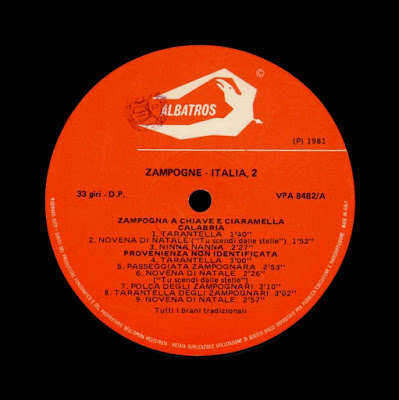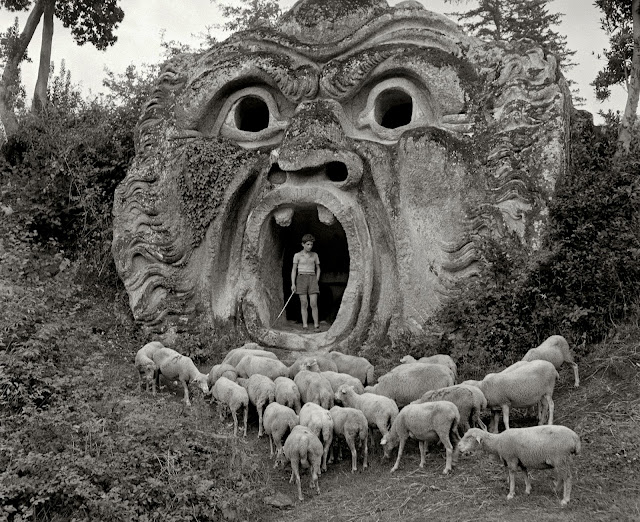ITALY – ITALIE
Zampogne / Bagpipes Italia Vol. 2 – Albatros VPA 8482 – curated by Febo Guizzi and Roberto Leydi , recorded 1912-1980 (LP)
Bagpipes – found principally in Western and Southern Europe, Northern Africa, Turkey, the Caucasus, and the Persian Gulf – are polyphonic woodwind instruments that consist of chanter melody pipes and drones with air continuously fed from an air bag usually made from animal hide.
The traditional Italian zampogne, or zampogna, bagpipes, sometimes accompanied by a double reed ciaramella oboe or a tamburello frame drum and singing, are found in many Italian regions, particularly in Southern Italy, where it is central to folk heritage and identity. The zampognari's pastoral roots are traced back to shepherds who spent long periods with their animals grazing in the countryside, where the zampogne would echo through the mountains. These musical shepherds also traditionally announced the coming of Christmas with their playing.
Following my share of Volume 1 of this superb Italian bagpipe anthology on the Albatros label, I’m delighted to present Volume 2, which showcases the classic duo of double-reed ciaramella oboes and zampogna bagpipes with keyed chanters from the regions of Calabria (A1-A3), Campania (B1-B4), and Lazio/Molise (B5-B9), as well as vintage recordings of Italian immigrants in the United States (A4, A5, A7, A8). This anthology includes historic field recordings, 78 RPM shellac discs and 45 RPM singles.
La cornemuse, que l'on trouve principalement en Europe occidentale et méridionale, au Maghreb, en Turquie, dans le Caucase et le golfe Persique, est un instrument à vent polyphonique composé de tuyaux mélodiques et de bourdons alimentés en continu par de l'air dans un sac-réservoir le plus souvent fabriqué à partir de peaux ou de vessies de bêtes.
La cornemuse italienne traditionnelle zampogne, ou zampogna, parfois accompagnée d'un tambour tamburello ou de chants, est présente dans de nombreuses régions en Italie, en particulier dans le sud, où elle elle occupe une place de choix dans l'identité et le patrimoine culturel. Les racines pastorales du zampognari remontent aux bergers accompagnant leurs animaux au pâturage qui faisaient résonner le zampogne dans les montagnes et les vallées. Ces bergers musiciens annonçaient également la venue de Noël avec leurs cornemuses.
Après avoir partagé le premier volume de cette superbe anthologie de cornemuses italiennes sur le label Albatros, je suis ravi de présenter le volume 2, qui met en valeur le duo traditionnel du hautbois ciaramella à anche double et de cornemuses zampogna enregistrés dans les régions de la Calabre (A1-A3), de la Campanie (B1-B4) et du Latium/Molise (B5-B9), ainsi que des enregistrements d'immigrants italiens aux États-Unis (A4, A5, A7, A8). Cette anthologie comprend des enregistrements historiques, ainsi que des disques 78 tours et des 45 tours.
CALABRIA
A1 – Tarantella*
Francesco Crudo (double reed ciaramella oboe) and Michele Monteleone (zampogna bagpipe with keyed chanters)
Rombiolo (Catanzaro), 1979;
A2 – Novena di Natale (Tu Scendi Dalle Stelle)*
Francesco Crudo (ciaramella oboe) and Michele Monteleone (zampogna bagpipe)
Rombiolo (Catanzaro), 1979;
A3 – Ninna Nanna
Zampognari calabresi (ciaramella oboe and zampogna bagpipe),
78 RPM A 1541 Fonotecnica A 1541 (c. 1928);
UNIDENTIFIED ORIGIN
A4 – Tarantella
Michele Lentine and Antonio Papariello (ciaramella oboe and zampogna bagpipe),
78 RPM I B-20594-1 / Victor (USA) 69708 (New York,
Septembre 24, 1917);
A5 – Passeggiata Zampognara
Michele Lentine and Antonio Papariello (ciaramella oboe and zampogna bagpipe),
78 RPM / B 20595-1 / Victor (USA) 69708 (New York,
Septembre 24, 1917);
A6 – Novena di Natale (Tu Scendi Dalle Stelle)
Zampognari del Molise (ciaramella oboe and zampogna bagpipe),
45 RPM / AF 544 (presumably Naples, c. 1960);
A7 – Polca Degli Zampognari
Trio di zampogne (two ciaramelle oboes and a zampogna bagpipe),
78 RPM / 85461-2 / Columbia (USA) E 4913 (New York,
July 4, 1920);
A8 – Tarantella Degli Zampognari
Trio di zampogne (two ciaramelle oboes, zampogna bagpipe and tamburello frame drum),
78 RPM f 85458-1 / Columbia (USA) E 4913 (New York, July 4, 1920);
A9 – Novena di Natale
Performed by Ciociari, with zampogna bagpipe and ciaramella oboe,
78 RPM 10304-0 Favorite 103008 (presumably Naples, pre-1912);
CAMPANIA
B1 – Fenesta Ca Lucevi**
Rocco Carbone (ciaramella oboe), Giuseppe Russo (zampogna bagpipe), Michele Strollo (singing)
Colliano (Salerno), October 11, 1980;
B2 – Novena Dell'immacolata**
Michele Strollo (ciaramella oboe and
singing), Antonio Russo (zampogna bagpipe)
Colliano (Salerno), October 11, 1980;
B3 – Tarantella**
Michele Strollo (ciaramella oboe), Giuseppe Russo (zampogna bagpipe)
Colliano (Salerno), October 11, 1980;
B4 – Marina Marina E Tarantella***
Giovanni Palermo (ciaramella oboe), Nicola Manzillo (zampogna bagpipe)
Auletta (Salerno), July 20, 1980;
LAZIO/MOLISE
B5 – Saltarello
Various ciaramella oboes and zampogna bagpipes,
Villa Latina (Frosinone), 1949;
B6 – Saltarello
Zampognari from Atina (Carmine Visocchi, ciaramella oboe; Giovanni Rossi, zampogna bagpipe),
78 RPM / WB 2956 / Columbia) DQ 426 (c. 1929);
B7 – La Ciociara
Zampognari di San Biagio,
Saracinisco (ciaramella oboe and zampogna bagpipe),
78 RPM / D 2817 / Durium M 9889 (c. 1951);
B8 – Tarantello Molisano****
Sante Tomassone (ciaramella oboe), Emilio Ruffo (zampogna bagpipe),
Castelnuovo al Volturno (Isernia), May 1979;
B9 – Novena di Natale
Angelo Valente (ciaramella oboe), F. Fusco (zampogna bagpipe),
78 RPM / A 10169 i Cetra DC 5590 (November 1952).
*Recorded by Roberto Leydi (1928-2003)
**Recorded by Ciro Caliendo
***Recorded by Febo Guizzi (1947-2015)
****Recorded by Maurizio Anselmi and Paolo Speca
here:
Please help me purchase important traditional records
to pursue my global curation project and share the
best finds with you on this blog:
%20-18%2087.jpg)
%2025%2082.jpg)




